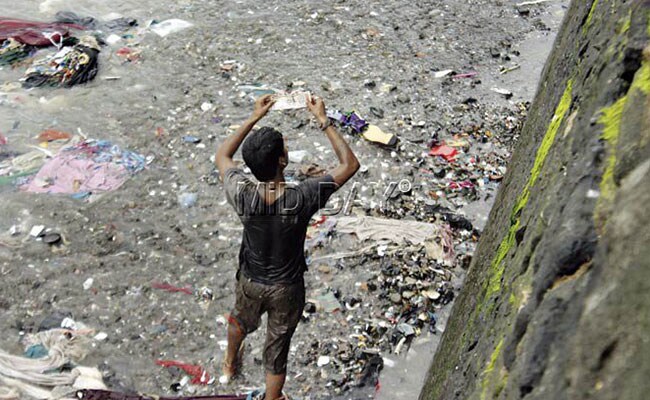
People jumped off the protective wall and dove into the sea to fish out the notes. A cloth rope was made to help divers climb back up with their treasure.
Mumbai:
Money doesn't grow on trees, but if you look hard enough, you might just find some floating in the sea. This is exactly what happened at the Gateway of India, where an unexpected windfall of money led to high drama and daredevilry all through Tuesday, as people jumped into the waves to fish out currency notes of Rs 1,000.
No one really knew where the money had come from, but as the word spread, the crowd began to swell and the number of people braving the tides increased, prompting the police to deploy personnel to ensure no more lives were risked.
Theories abound
Various theories were put forward by onlookers at the scene, but the police have not confirmed any of them and have only said that the source of the money is unknown. Some said the money was flung into the sea by some unidentified wealthy person who was cornered by thugs at the Gateway around noon.
To get rid of the thieves, he hurled the bundle of money - rumoured to contain a few lakh rupees - into the sea. The second theory is that the money may have come from a garland made of currency notes, the kind often used for religious ceremonies. Sources also suggested that the money may have been planted in the sea to distract security agencies in what could have been a dry run ahead of a future attack in the area. Whatever the origin, the money began to float towards the shore soon after noon, washing up against the protective wall separating Radio Club and the sea.
Sources also suggested that the money may have been planted in the sea to distract security agencies in what could have been a dry run ahead of a future attack in the area. Whatever the origin, the money began to float towards the shore soon after noon, washing up against the protective wall separating Radio Club and the sea.
Local fishermen, swimmers and hawkers spotted the money first - mostly Rs 1,000 notes - and jumped across the wall to retrieve the cash. As word spread, people turned up from as far as Colaba and Cuffe Parade in search of the lost treasure. People sat on the wall, staring into the sea for hours, waiting to spot a note.
On several occasions, a note would float ashore but before they could retrieve it, it would be washed away again. Several notes were visible in the sea until late evening. Hari Suraiya, a Colaba resident, retrieved Rs 1,000. "I got to know of the floating money and had gone to watch.
But when I spotted a note myself, I climbed down to retrieve it. It did not take more than 10-15 minutes," said Suraiya. A makeshift cloth rope was made to help the divers climb back up. Once up, these people would rush off to escape the police. For a good three to four hours, people braved the seas as there was no policeman stationed there. 
Some people fished out as much as Rs 3,000. Passers-by took pictures and there was much discussion on social media about the floating treasure at the Gateway of India. Around 4 pm, a drenched and shivering S K Shakil clambered up the wall with a Rs 1,000 note.
"I will donate it to the Masjid," he said, while another diver, Santosh Pawar said, "Apne bachcho ko achha khana khilaunga" (I will buy my children a good meal with the money). Pawar had, in fact, spotted several notes in the sea, but could only grab one before the cops called him and took him to the police station. There, he was let off with a warning.
No one really knew where the money had come from, but as the word spread, the crowd began to swell and the number of people braving the tides increased, prompting the police to deploy personnel to ensure no more lives were risked.
Theories abound
Various theories were put forward by onlookers at the scene, but the police have not confirmed any of them and have only said that the source of the money is unknown. Some said the money was flung into the sea by some unidentified wealthy person who was cornered by thugs at the Gateway around noon.
To get rid of the thieves, he hurled the bundle of money - rumoured to contain a few lakh rupees - into the sea. The second theory is that the money may have come from a garland made of currency notes, the kind often used for religious ceremonies.

Local fishermen, swimmers and hawkers spotted the money first.
Local fishermen, swimmers and hawkers spotted the money first - mostly Rs 1,000 notes - and jumped across the wall to retrieve the cash. As word spread, people turned up from as far as Colaba and Cuffe Parade in search of the lost treasure. People sat on the wall, staring into the sea for hours, waiting to spot a note.
On several occasions, a note would float ashore but before they could retrieve it, it would be washed away again. Several notes were visible in the sea until late evening. Hari Suraiya, a Colaba resident, retrieved Rs 1,000. "I got to know of the floating money and had gone to watch.
But when I spotted a note myself, I climbed down to retrieve it. It did not take more than 10-15 minutes," said Suraiya. A makeshift cloth rope was made to help the divers climb back up. Once up, these people would rush off to escape the police. For a good three to four hours, people braved the seas as there was no policeman stationed there.

Some people fished out as much as Rs 3,000. Passers-by took pictures and there was much discussion on social media about the floating treasure at the Gateway of India. Around 4 pm, a drenched and shivering S K Shakil clambered up the wall with a Rs 1,000 note.
"I will donate it to the Masjid," he said, while another diver, Santosh Pawar said, "Apne bachcho ko achha khana khilaunga" (I will buy my children a good meal with the money). Pawar had, in fact, spotted several notes in the sea, but could only grab one before the cops called him and took him to the police station. There, he was let off with a warning.
Track Latest News Live on NDTV.com and get news updates from India and around the world

